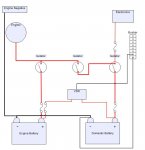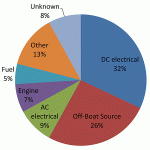boatmike
Well-known member
While upgrading my charging system I am questioning the wisdom of fitting a main fuse and where to put it. Several publications show a fuse of 100/120 amp in the line from service battery to services. Victron show a "max 100 amp" fuse protecting the VCR. One publication I have suggests putting one in the main negative lead arguing that it protects both batteries which is novel. Others don't show a fuse at all. None show a fuse in the engine positive start line. This leads me to ask "why have one at all?" All services are individually fused so any equipment shorts after the distribution panel are catered for at much less than 100 amps so all a fuse at the battery terminal protects against is a short in the power line up to that point. It does appear that no publication suggests a fuse at the starter battery so why have one at all on the service battery? I can see that Victron consider protection of the VCR might be advantageous but the chances of the relay seeing 100 amps is surely remote? how many of you have a main fuse at all and if so where and why?



